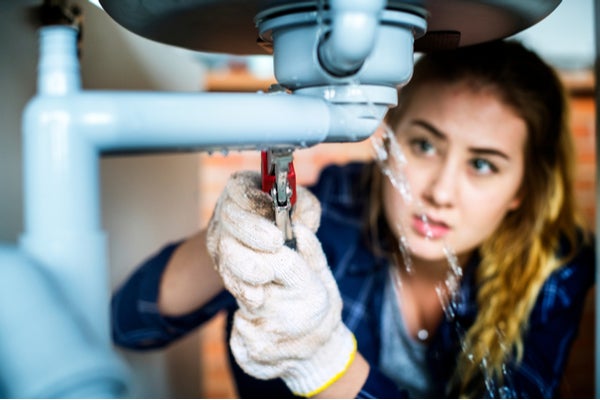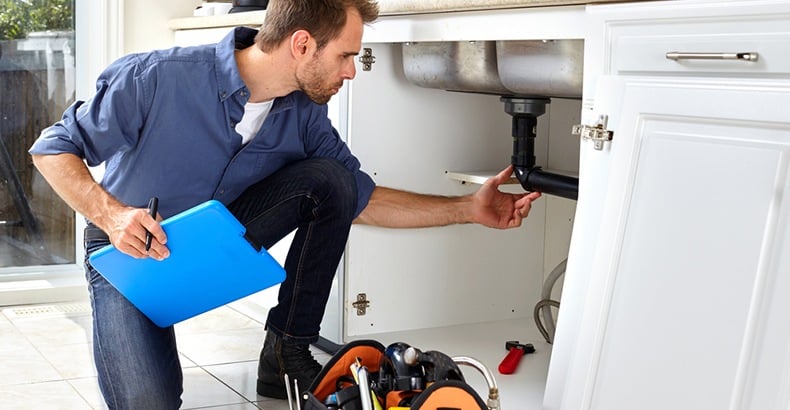6 Reasons Behind Your Degradation To The Plumbing Systems
6 Reasons Behind Your Degradation To The Plumbing Systems
Blog Article
Just about every person seems to have his or her own notions on the subject of Can Hard Water Ruin Your Appliances?.

The secret to long-term appliances, unsurprisingly, is proper maintenance. There's no set guideline that can ensure your plumbing home appliances a long wear, however you can avoid unnecessary damages as well as repair work by staying clear of poor plumbing habits.
You ought to quit doing these 6 things else you'll maintain calling your plumber over for minor faults.
Purging everything
Yes, your commode drainpipe causes the sewers, yet that doesn't indicate you need to dispose simply anything away. Several 'flushable' materials are actually wonderful clog beginners, for instance dental floss. Asides keeping apparent non-flushable materials like wires and also plastics out of your commode, you ought to additionally avoid flushing cotton buds, menstrual products, wipes, daipers as well as condoms down the commode drain.
Putting oil in the sink
We understand correctly getting rid of grease after a hearty meal is a pain. However simply pouring it down the drain can do long-lasting injury to your pipelines. "The fat and also grease can clog your drain terribly sufficient to force you to call a plumber," discusses Dawson. "Plumbing functions best when it's well taken care of-- not abused with grease."
Utilizing too much drainpipe cleaner
Making use of a drain cleaner more than one or two times a month is an indicator that something major is going on within your pipelines. Currently, as opposed to dealing with the primary problem, you go for a quick fix; a fizzy drainpipe cleaner. Rightfully, a drainpipe cleaner will care for the blockage, but at what cost?
The chemicals in a drainpipe cleanser can accelerate the corrosion of your pipelines. Add that to whatever underlying problem is creating the clog and you may need to a serious problem on your hands.
If you experience too many obstructions, call your emergency plumber instead of making use of a drain cleaner.
Not washing recipes before loading them right into the dishwasher
it's called a dish washer, but throwing in meals, pots, and pans covered in large food bits can really cause some significant damage to the home appliance, resulting in lasting troubles down the line. "House owners may have to obtain their dish washer repaired more frequently if they do not wash their meals prior to packing, or at least eliminate larger food pieces," explains Audrey Monell, proprietor of Forrest Anderson Plumbing and also A/c in Glendale, Arizona. "Food that obtains stuck on recipes triggers the dishwashing machine to function harder, which can wear down components much faster, causing troubles."
DIYing whatever
With plumbing, a stitch in time actually does save 9. You can stop a fullblown plumbing emergency by calling your plumber at the right time.
You might have learnt a few plumbing hacks from your daddy, however you should certainly know where to fix a limit and also call a professional. As an example, you might be able to take care of a clog on your own, however you shouldn't try to alter a pipeline. You might inequality pipes or overtighten a bolt, creating even more injury as well as damages than you thought. Calling a plumber is a safe and also cost effective decision.
Not changing your dishwasher hose pipes
One simple method to make certain that you utilize your dishwasher for years is to replace the hose at the very least when in 5 years. This additionally makes an application for cleaning maker hoses.
Gradually, food fragments, soap and oil can form obstructions within your pipes. Replacing them on time will certainly protect against any type of presure accumulate that can damage the interior functions of your dishwasher or washing equipment.
An enhanced steel intertwined tube does a wonderful work of extending your maker's use time.
No winter precautions
Severe weather conditions are bad for your pipelines, particularly if they're constructed from steel. You should protect your subjected pipes, as well as your water tank, even if you have a hot water heater. You ought to also switch off your yard tube valve and any other outside water networks. These networks are electrical outlets for chilly; you pipelines can begin to ice up from outdoors if you do not.
How Hard Water Damages Your Plumbing and Appliances
Hard water is no stranger to most households across America. This silent invader affects 85% of homes in the United States every day, wreaking havoc on pipes, plumbing fixtures, and water-using appliances.
Should you become a victim of hard water, you must understand exactly what it is and how it affects your plumbing and appliances. This will help you determine the correct measures to put in place to fix or prevent any problems that may arise.
First off, what exactly is “hard” water?
In short, “hard water” is used to describe water that contains relatively high amounts of dissolved minerals, primarily calcium and magnesium, and a host of trace metals. When rainwater falls from the sky (usually in a pure form), it absorbs the hardness minerals from rocks and soil, which changes it from soft to hard water.
What about my plumbing and appliances?
Mineral deposits from hard water can cause buildup on tubs, shower, sinks, faucets. But that’s only a small scratch of the surface. Those minerals can gradually build up inside pipes, fixtures, water heaters, washing machines, and dishwashers. Once they accumulate in those areas, they can clog pipes and create major problems throughout your plumbing system, from reduced water flow to increased pressure on pipes and fixtures.
This limescale buildup might affect some appliances, causing them to operate less efficiently and wear down faster. And the result? Higher energy bills, more (costly) plumbing replacements and repairs, and damaged appliances.
Keep in mind that certain types of plumbing are more susceptible to clogging than others. Copper, PVC, and PEX pipes are more resistant to hard water buildup and corrosion, but they can still get clogged or completely blocked by scale deposits.
How do I know if my water is hard?
White limescale buildup on plumbing fixtures (or any of the other signs mentioned above) is usually a good sign that your water is hard. If you suspect that you have hard water, you can simply shake up a small amount of dish soap and water in a closed container. If the mixture doesn’t create a lot of suds, you probably have hard water.
The most precise method, however, is to test your water with a DIY test kit (sold online or at local home centers or hardware stores) or send a water sample from your tap to a local lab to be tested. Be sure that you understand the nature of the test, the water condition being measured, and the significance of the test results.
Another way to obtain an estimate of water hardness is to check your annual water quality report to see if your water provider has reported any instance(s) of water hardness in your water supply.
https://www.springwellwater.com/how-hard-water-damages-your-plumbing-and-appliances/

Do you appreciate reading about Can Hard Water Ruin Your Appliances?? Place feedback below. We would be glad to listen to your thoughts about this posting. We are looking forward that you come back again in the near future. Sharing is caring. You won't know, you may be helping someone out. Thank you for going through it.
This Page Report this page